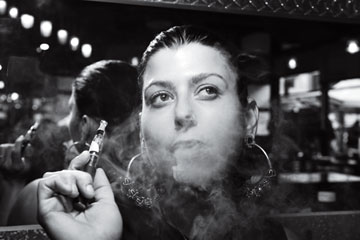
(4 of 7)
Babaian, the owner of the Vape stores in New York, is one of these evangelists. Electronic cigarettes cured her two-pack-a-day habit, so when her county on Long Island introduced a ban on e-cigarette smoking in public places, she and a club of vapers she organized lobbied to stop it. They failed, but their efforts continued. The club met in diners to vape and talk and pool together a few bucks to fund research on e-cigarette safety. "We didn't realize research costs $150,000," she says. Realizing she needed more, she took the movement national, starting an annual conference called Vapefest. The money was raised, and the study was completed in October 2012. Now Babaian is focusing on the New York City council's regulations, which could include a flavor ban designed to dissuade children. Babaian is in favor of FDA testing of flavoring and believes some can be dangerous, but an outright flavor ban--she says 63% of her stores' sales are flavors--could destroy her business.
On the day I visited her Manhattan store, a young man handed Babaian his ID. He had only just turned 18, and Babaian looked up at him. "Do you smoke cigarettes?" she asked. He told her he smoked only electronic cigarettes, the disposable ones (easily purchased at a corner store), and now he wanted to try one of hers. In between helping other customers, she tried to dissuade him. Why not try the patch or the gum? It would be better if he didn't become dependent on the hand-to-mouth motion, she said. Finally, he offered that he sometimes smoked mini-cigars, and she agreed to sell him an e-cigarette without nicotine. She implored me not to write about the kid. It was rare to get someone so young in the store, she said, and she doesn't sell to minors anyway. As he left, she told him to act like an adult. Don't goad people or show off the e-cig to teachers, she said, or "you are going to get this banned and people are going to die."
Craig weiss, the CEO of NJOY, is not about to let that happen. The youngest of seven children born to a patent attorney and a federal judge, Weiss has the confidence of a man who has never failed. He won his first patent, for an apparatus to keep tennis balls from flying off the court, when he was 13. After graduating from the University of Pennsylvania, he co-authored a book, while at law school at Arizona State, about American soldiers who fought in Israel's war of independence. Benjamin Netanyahu wrote the foreword. After stints as a patent attorney and a hedge-fund manager, Weiss became the CEO of NJOY in 2010. (The company was started by his brother Mark in 2006 after he encountered an electronic cigar in China.)
